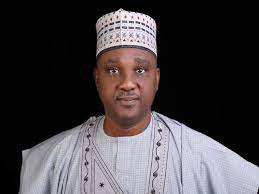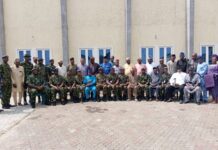
By EricJames Ochigbo
Speaker of the House of Representatives, Tajudeen Abbas, has underscored the need for political stability to achieve desired development in the country.
Tajudeen spoke at the 2023 Democracy Day Lecture organised by the National Institute for Legislative and Democratic Studies (NILDS) on Thursday in Abuja.
The News Agency of Nigeria (NAN) reports that the theme of the lecture was “Democracy and the State of the Nation: Towards Agenda Setting for the New Administration.”
Represented by the Deputy Speaker, Rep. Benjamin Kalu, Abbas said that democracy remained the best means to ensure sustainable development that would meet the needs and interest of the people.
“We must prioritise political stability in the new administration to achieve the desired development and attract sustainable foreign investments.
“Democracy provides the liberal environment necessary for innovation, creativity and growth.
“Undeniably, is the best means to ensure sustainable development that meets the needs and interest of our people,” he said.
The Director-General of NILDS, Prof. Abubakar Sulaiman, said that the lecture was very significant as it offered the opportunity to take stock of the nation’s democratic governance.
He said it would also highlight the political and socio-economic challenges, and make recommendations that would be useful for the agenda-setting mechanism for the new administration.
The DG said that in the political sphere, there had been unabated calls for restructuring of Nigeria’s federal system, as well as other issues bordering on our elections and power transition.
He said that there had also been calls for economic governance, challenges of poor coordination between monetary and fiscal policies and the need for functional public spending that engendered access to public service.
Sulaiman said that the implication of the fuel subsidy removal and the need for interventions that would cushion the effects were issues that resonated.
“From the angle of governance and representation, the need for inclusion in the nation’s leadership spectrum, one of the most discussed issues.
“Inclusion of excluded groups such as persons with disabilities, women, young people, and Nigerians in the diaspora in the nation’s democratic process, including elections, are other aspects of inclusion discourse warranting scholarly engagement.
“These challenges place a lot of expectations on the new administration and thus, require informed perspectives to enhance governance outcomes at the Federal, State, and Local Government levels,” he said.
Sulaiman said though Nigeria had made steady progress with democratic transition from the first to the fourth republic, lessons from developments in Africa offered Nigeria an opportunity to reflect and commit to entrenching democratic processes.
According to him, the Rwandan genocide, the civil wars in Cote D’Ivoire and Mali, the outbreak of war in Sudan, as well as the violent protest in Senegal are some unpleasant examples.
“As such, there is a need to address the insecurity besetting our nation as it poses a threat to our democracy.
“Therefore, the new government should do something urgently to address the menace of insecurity bedeviling our country and undermining our collective resolve.
“It is in connection to the above that continuous appraisal of our democratic journey, in fora such as this, is vital to take stock and draw lessons for the progress of our country, Nigeria,” he said.
In a lead paper, Prof. Okechukwu Ibeanu said there was a disconnect between democracy and development in the country.
The professor said that to change the narrative, there was need to reconnect democracy and development.
He said that any administration genuinely interested in setting an agenda that would deal with the state of Nigeria, would have to address five key things.
“The quality of works and reward in Nigeria, the quality of participation and representation, the quality of institutions either political or economic and by that I mean rules that govern our behaviour.
“The while question of accountability and redress and lastly the quality of local governance,” he said.
Ibeanu said that there is need for accountability in electoral institutions like INEC, security agencies, the media and the Judiciary.
He said that so much confidence in technology to solve electoral challenges was a problem, saying that a situation where there was lack of trust in institutions, technology could not solve the problem. (NAN)



